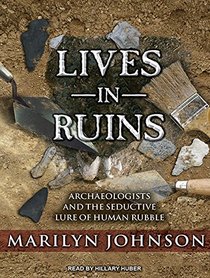A reader can expect the unexpected from the author Marilyn Johnson. Because I'd read THE DEAD BEAT, I knew this writer would take me on travels I couldn't imagine before opening the book. She starts out as I expected, taking her readers on a trip to learn how to be a rubble digger. I have a new respect for archeologists. They are poorly paid and always struggling for their next job. And yet, they love what they do. Their work is hard, both the digging and the daily reporting.
Johnson took me to visit sites and conferences. She told stories about past riches being unearthed but also about the people who do this back-breaking work. It was fascinating to learn that archeology is looked down upon in Japan because the archaeologists are keeping builders from their rush to build new edifices. 'All archeology in Japan, is emergency work,' according to a Johnson interviewee.
I was amazed to learn that the US military has in-house archeologists and part of their job is to teach new recruits an appreciation of the (worldwide) sites they want to protect, even during a war. They even created decks of cards for Afghanistan and Iraq, so the soldiers could learn archeological tips while playing cards. How cool is that?
This is one book I expect to read again. There is so much to learn in this tome that I want to digest what I have learned in the last few days and then read it again for greater understanding.
Johnson took me to visit sites and conferences. She told stories about past riches being unearthed but also about the people who do this back-breaking work. It was fascinating to learn that archeology is looked down upon in Japan because the archaeologists are keeping builders from their rush to build new edifices. 'All archeology in Japan, is emergency work,' according to a Johnson interviewee.
I was amazed to learn that the US military has in-house archeologists and part of their job is to teach new recruits an appreciation of the (worldwide) sites they want to protect, even during a war. They even created decks of cards for Afghanistan and Iraq, so the soldiers could learn archeological tips while playing cards. How cool is that?
This is one book I expect to read again. There is so much to learn in this tome that I want to digest what I have learned in the last few days and then read it again for greater understanding.





